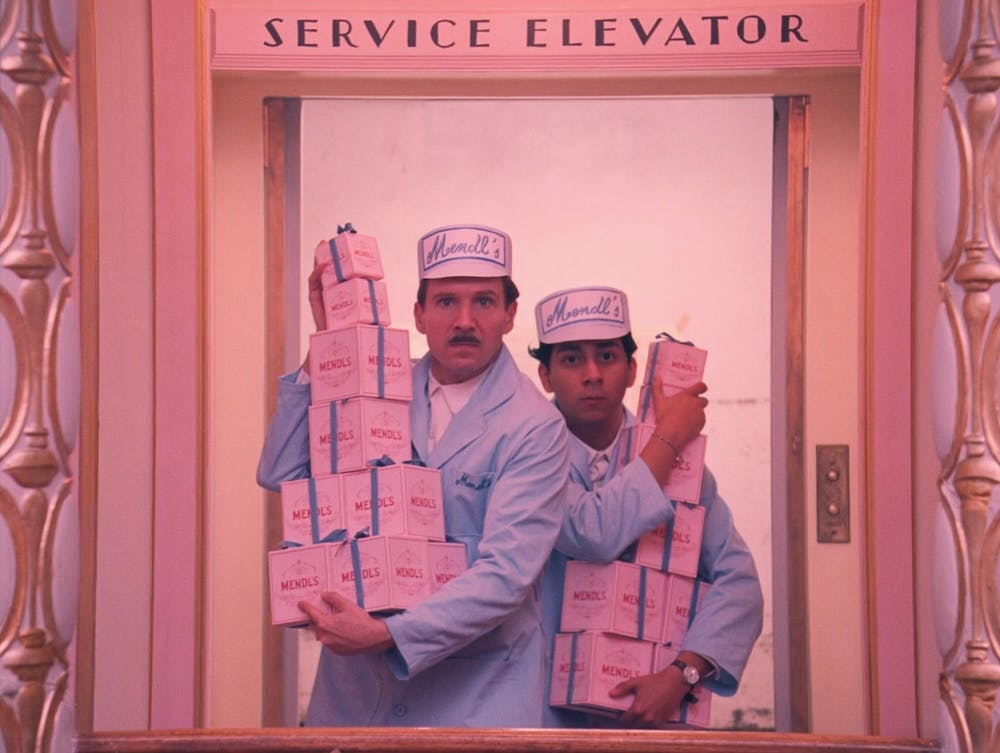The Grand Budapest Hotel (2014)
“You see, there are still faint glimmers of civilization left in this barbaric slaughterhouse that was once known as humanity. Indeed that’s what we provide in our own modest, humble, insignificant... oh, f*** it.” — M. Gustave
A Quick Summary
With the help of his lobby boy, a philandering concierge steals a painting bequeathed to him by a wealthy hotel patron whom he is accused of murdering. On the run from both the patron’s family and the law, as well as a fascistic regime, Zero and Gustave must embark on a daring journey to clear the name of Monsieur Gustave H.
Reception at the Time
The Grand Budapest Hotel was received positively by critics and audiences alike, many saying it was the ultimate culmination of what Wes Anderson had been working towards up until that point in his career. Critics noted its decadence and whimsy in contrast to the underlying dark themes. It was nominated for Best Picture and garnered the most Oscars during the 87th Academy Awards, tied with Birdman. It remains the only Wes Anderson film to win Oscars.
Audiences rewarded it with the largest box office return for a Wes Anderson film to date, more than double any of his other films.
How It’s Aged
The hand-crafted quality of the film itself made it feel like a precious relic in 2014, and time has only strengthened that aesthetic. It reminded me of the still-delightful Monty Python animated sequences. The beautifully realized miniatures that serve as the zoomed-out setting for Zubrowka serve the double purpose of creating this aesthetic while masterfully portraying the geography we’re working within.
The Grand Budapest Hotel perfectly sums up Wes Anderson’s filmography up until 2014. All of his previous films come into play here in a way that seems to distill and perfect key aspects of each one, from Bottle Rocketwith its bumbling criminals on the run to Fantastic Mr. Fox with its vibrant palette and intricate set designs.
On top of being a culmination of his work, it now serves as table setting for Wes Anderson’s films to come. The nesting doll structure that opens and closes this film eventually takes center stage in Asteroid City last year, and especially in his recent short, The Wonderful Story of Henry Sugar. I believe these elements have only increased Grand Budapest’s standing as a film that balances where Wes was heading with a more standard storytelling structure.
On top of informing his own future work, you can feel the influence of this film on one filmmaker in particular: Paul King. Paddington 2 (2017) specifically calls back to this film with its prison break and love of pink.
Finally, I’d like to give a shout-out to Ralph Fiennes and his emergence as a comic genius in this film. His delivery is incredible, and I can’t help but link it to his more recent role in The Menu (2022), which made me laugh out loud more than any other film that year.
Best Parts
Not to sound like a broken record, but Ralph Fiennes is the best part of this film. I read that this role was specifically written for him, and I can feel it. He embodies this unique character who himself embodies Anderson’s films as a whole: tidy and refined, yet an absolute mess inside. On top of all this, he embodies 1930s Europe with all the crisp, sharp uniforms spreading darkness across the land.
I’d also like to give a shout-out to a few standout sequences: the jailbreak, the museum chase, and the ski chase. Taken together, you get a good idea of the breadth of Anderson’s abilities. They are all of a piece in that they fit the aesthetic of the film, but are all interesting and fun in their own right.
Overall
Grand Budapest has grown in my esteem and has been my favorite of Anderson’s films for a few years now. To me, it’s infinitely rewatchable and is more fun with each viewing.
It’s easy to focus on the surface, as I’ve mostly done in this review, but the underlying themes around fascism and immigration make it more relevant than ever and ultimately turn this from a sweet treat into a full meal.
“There are still faint glimmers of civilization left in this barbaric slaughterhouse that was once known as humanity... He was one of them. What more is there to say?” — Zero
Published on Tardy Critic, a film blog where movies are reviewed ten years late.
